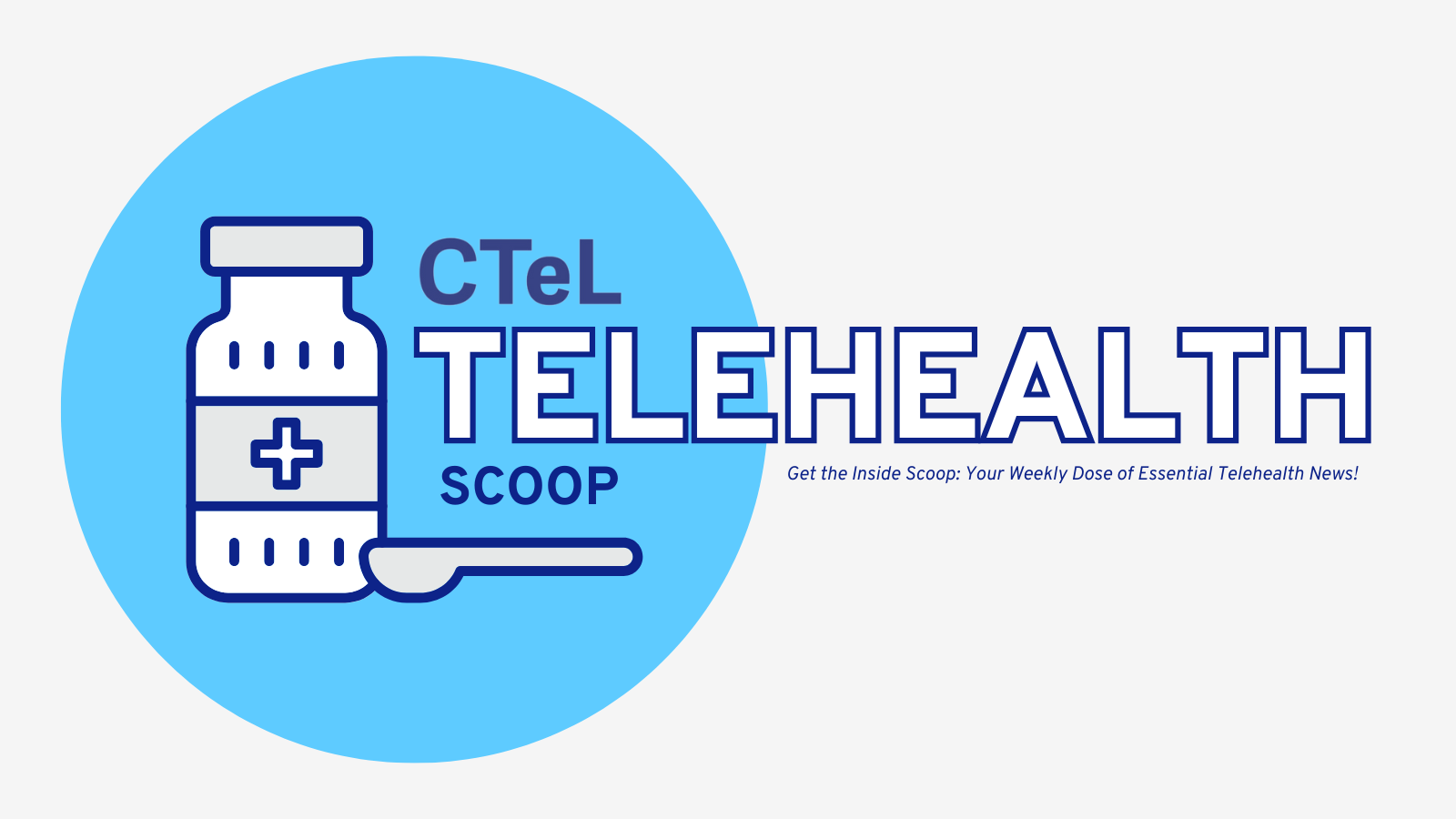
A Grateful Reflection on Digital Health: Advancing Access to Care and Building the Future Together
As we reflect during this season of gratitude, it is an opportune moment to celebrate the groundbreaking strides made in telehealth, artificial intelligence (AI), remote patient monitoring (RPM), and digital health. These advancements, underpinned by transformative legislation, have opened doors to accessible and equitable care for millions.

CTeL Urges Congress to Cement Telehealth’s Future and Embrace Healthcare Innovation
The Center for Telehealth and e-Health Law (CTeL) has presented a comprehensive agenda urging the 119th Congress to champion telehealth access, remote monitoring technologies, and artificial intelligence (AI) innovation in healthcare. In a detailed letter to Congressional leaders, CTeL outlined legislative priorities that address urgent healthcare challenges while fostering cost-effective, patient-centered care models.

FDA Digital Health Advisory Committee Meeting: Key Takeaways on Generative AI in Healthcare
The FDA Digital Health Advisory Committee convened on November 20-21, 2024, to address the evolving role of generative AI in healthcare. This pivotal meeting brought together experts to discuss the opportunities and challenges posed by these technologies, emphasizing safety, equity, and accountability.

CTeL Urges Trump Transition Team to Expand Telehealth, Combat Drug Overdose Crisis, and Drive Health Innovation
The Center for Telehealth and e-Health Law (CTeL) is calling on the incoming Trump Administration to continue the momentum of digital health innovation and policy reforms initiated during the COVID-19 pandemic. In a recent letter to Linda McMahon and Howard Lutnick, Co-Chairs of the Presidential Transition Team, CTeL outlined recommendations to expand telehealth access, bolster measures to combat the opioid crisis, and accelerate the adoption of remote monitoring and AI-driven health technologies.

CTeL Featured in Inside Telehealth: Advocating for Telemedicine's Future
We’re proud to see Christa Natoli, Executive Director of the Center for Telehealth and e-Health Law (CTeL), featured prominently in Inside Telehealth's coverage of the DEA’s extension of telemedicine prescribing flexibilities through 2025. This highlights CTeL’s leadership in advocating for patient-centered telehealth policies and sustainable solutions for prescribing controlled substances.

DEA and HHS Extend Telemedicine Prescribing Flexibilities, Securing Patient Access to Care Through 2025
In a pivotal decision, the Drug Enforcement Administration (DEA) and the Department of Health and Human Services (HHS) announced a third temporary extension of telemedicine prescribing flexibilities for controlled substances. Effective from January 1, 2025, to December 31, 2025, the rule maintains critical healthcare access for millions of patients while providing time for regulators to refine long-term telehealth policies.

Breaking News: OMB Approves DEA's Final Rule Extending COVID-19 Telemedicine Flexibilities for Controlled Medications
The Office of Management and Budget (OMB) has completed its review of the "Third Temporary Extension of COVID-19 Telemedicine Flexibilities for Prescription of Controlled Medications," allowing patients continued access to prescribed controlled substances via telehealth without an in-person visit. This temporary extension offers an important reprieve for patients and providers alike as we await a proposed rule for a permanent telemedicine prescribing policy.

CTeL Appoints New Leadership for AI Blue Ribbon Collaborative to Advance AI Integration in Healthcare
The Center for Telehealth & e-Health Law (CTeL) has announced new leadership for its Artificial Intelligence (AI) Blue Ribbon Collaborative, a key initiative supporting healthcare organizations in navigating the clinical and legal implications of AI. The Collaborative, which brings together experts from diverse disciplines, serves as an independent resource to aid healthcare entities in integrating AI effectively and responsibly into clinical practice, adhering to rigorous ethical and regulatory standards.

Privacy in the Age of Remote Patient Monitoring: Insights and Actions from CTeL’s Annual RPM Conference
In today’s fast-evolving healthcare landscape, remote patient monitoring (RPM) is redefining patient care. Yet, as these technologies become increasingly integrated into patients’ daily lives, concerns about privacy and security are intensifying. At CTeL’s third annual RPM conference, experts Anura Fernando, Global Head of Medical Device Security at UL Solutions, and Dr. Anthony Magit, Associate Chief Medical Officer at Rady Children’s Hospital, provided crucial insights into the risks and solutions for maintaining privacy in RPM. Their discussion underscored the need for not just secure data, but also secure environments, and offered healthcare providers a roadmap to safeguarding patient privacy in this new era.

Navigating Compliance and Consent in Remote Patient Monitoring: Key Takeaways from CTeL’s RPM Conference
As telehealth and AI technologies continue to transform healthcare delivery, remote patient monitoring (RPM) stands out for its potential to improve patient outcomes. But with innovation comes a growing list of compliance challenges. At the Center for Telehealth and e-Health Law (CTeL)’s third annual Remote Patient Monitoring Conference, legal expert Adam Solander tackled the thorny issues of data privacy, informed consent, and compliance as they pertain to RPM systems.

CMS Final Rule Update: Key Telehealth Provisions in the 2025 OPPS and ASC Systems
The Centers for Medicare & Medicaid Services (CMS) recently released its final rule for the 2025 Medicare Hospital Outpatient Prospective Payment System (OPPS) and the Medicare Ambulatory Surgical Center (ASC) payment systems, highlighting pivotal telehealth advancements that aim to transform healthcare delivery. The rule introduces changes impacting access to care for Medicaid and Medicare beneficiaries, particularly those in underserved areas or requiring specialized services. Here’s an overview of the telehealth-focused updates that reflect CMS’s commitment to expanding healthcare accessibility and aligning policies across diverse care settings.

Breaking Barriers in Telehealth: How New RPM Rules and Reimbursement Changes Could Shape the Future of Remote Care
The latest session hosted by CTeL on "Remote Patient Monitoring (RPM) and Reimbursement: Navigating the Financial Landscape" offered significant insights into policy updates, financial challenges, and future regulatory actions impacting RPM. Featuring Zach Hochstetler, Vice President of Coding and Payment at the American Medical Association (AMA), the discussion provided a close look at recent changes in RPM protocols and reimbursement structures, with important implications for healthcare providers and payers navigating this evolving landscape.

Unpacking the Future of Data-Driven Healthcare: Clinical Outcomes, Financial Strategies, and AI Integration.
The Center for Telehealth and e-Health Law (CTeL) gathered a diverse audience of healthcare leaders, policymakers, and technology experts for its Third Annual Remote Patient Monitoring (RPM) Summit. One of this years featured sessions, "Data-Driven Healthcare, Clinical Outcomes, and Financial Benefits," focused on leveraging RPM and artificial intelligence (AI) to enhance patient outcomes and streamline healthcare costs. In a dynamic session featuring Dr. David Bates, Medical Director of Clinical and Quality Analysis at Mass General Brigham, and Dr. Kapil Parakh, Senior Medical Lead at Google, the discussion centered on RPM’s evolving role in healthcare, actionable strategies for implementation, and practical policy recommendations.

CTeL RPM Summit Highlights—AI’s Game-Changing Role in Remote Patient Monitoring
Last week, CTeL (Center for Telehealth and e-Health Law) hosted a transformative discussion on AI and Machine Learning (ML) integration in Remote Patient Monitoring (RPM) at its Third Annual Virtual RPM Summit. This year’s session titled "AI and Machine Learning in Remote Patient Monitoring" brought together Dr. Ravi Parikh, medical oncologist at Emory University, and Dr. Fei Wang, professor and director of AI for Digital Health at Weill Cornell Medicine. Both experts shared actionable insights on the opportunities, challenges, and urgent need for standardized practices in AI-driven RPM.

Advancing Remote Patient Monitoring: Congressional Insights from CTeL’s Third Annual RPM Summit
This year’s Third Annual Virtual Remote Patient Monitoring (RPM) Summit, hosted by the Center for Telehealth and e-Health Law (CTeL) on November 1, 2024, brought together leaders from legislative offices, healthcare, and technology sectors to tackle the pressing question: How can the U.S. improve access to healthcare through remote patient monitoring and digital health solutions? At the heart of the summit was the session “Congressional Insights on Remote Monitoring Legislation,” featuring legislative aides Tucker Williamson, representing Rep. Neil Dunn (R-FL), and Josh Joffe, representing Rep. Sheila Cherfilus-McCormick (D-FL). Together, they unpacked the current policy landscape and legislative priorities essential to advancing RPM in an increasingly digital healthcare ecosystem.

Breaking News: CMS Finalizes Telehealth Changes in 2025 Physician Fee Schedule (PFS) Rule
November 1, 2024 – In a major policy update, the Centers for Medicare & Medicaid Services (CMS) has issued the final rule for the Calendar Year (CY) 2025 Medicare Physician Fee Schedule (PFS), effective January 1, 2025. This new rule outlines a sweeping set of changes aimed at creating a more equitable, accessible, and innovative healthcare system. Key modifications focus on telehealth services, expanding access for beneficiaries while adjusting certain policies established during the COVID-19 Public Health Emergency (PHE).

B.E.F.A.S.T and Be a Stroke Superhero.
Could you spot the signs of a stroke if they appeared right in front of you? Most people think of strokes as causing loss of speech or balance, but the earliest symptoms can be much more subtle—and spotting them quickly can save lives. Thanks to an inspiring father-son duo, Dr. Rajiv Narula and his 5-year-old son, Ayan, the importance of early stroke detection is now accessible to even the youngest among us, empowering kids to help recognize stroke signs in their own families.

Sweet 16 No More: AMA’s New Billing Flexibility for Remote Physiologic Monitoring (RPM)
The American Medical Association (AMA) recently announced a significant change to its billing policy for Remote Physiologic Monitoring (RPM). Starting in January 2026, the AMA will eliminate the requirement for patients to transmit RPM data for 16 out of 30 days to qualify for provider reimbursement. This decision removes a barrier that has hindered RPM’s practical application and aligns more closely with how providers and patients actually use RPM technology.

Trump vs. Harris: Exploring the Diverging Approaches to Digital Health
Telehealth and digital health has become a crucial component of modern healthcare, especially in light of the COVID-19 pandemic, which necessitated rapid adaptation to virtual care. Both the Trump administration and a potential Harris administration have taken steps to advance telehealth, albeit through differing strategies.

CTeL Encourages Balanced AI Regulations in Healthcare, Across the Board.
Advocating for balanced AI regulations in healthcare is critical to ensuring that we unlock the full potential of this transformative technology. Artificial intelligence (AI) offers unparalleled opportunities to improve patient outcomes, increase access to care, and reduce healthcare costs, particularly in telehealth services. From enhancing diagnostic accuracy to streamlining administrative tasks, AI can enable healthcare providers to deliver faster, more personalized, and more efficient care.
Subscribe to the Telehealth Scoop!
Get the latest telehealth policy news you need to know, right to your inbox. Stay up-to-date on all the latest CTeL happenings, events, actions, and more!

